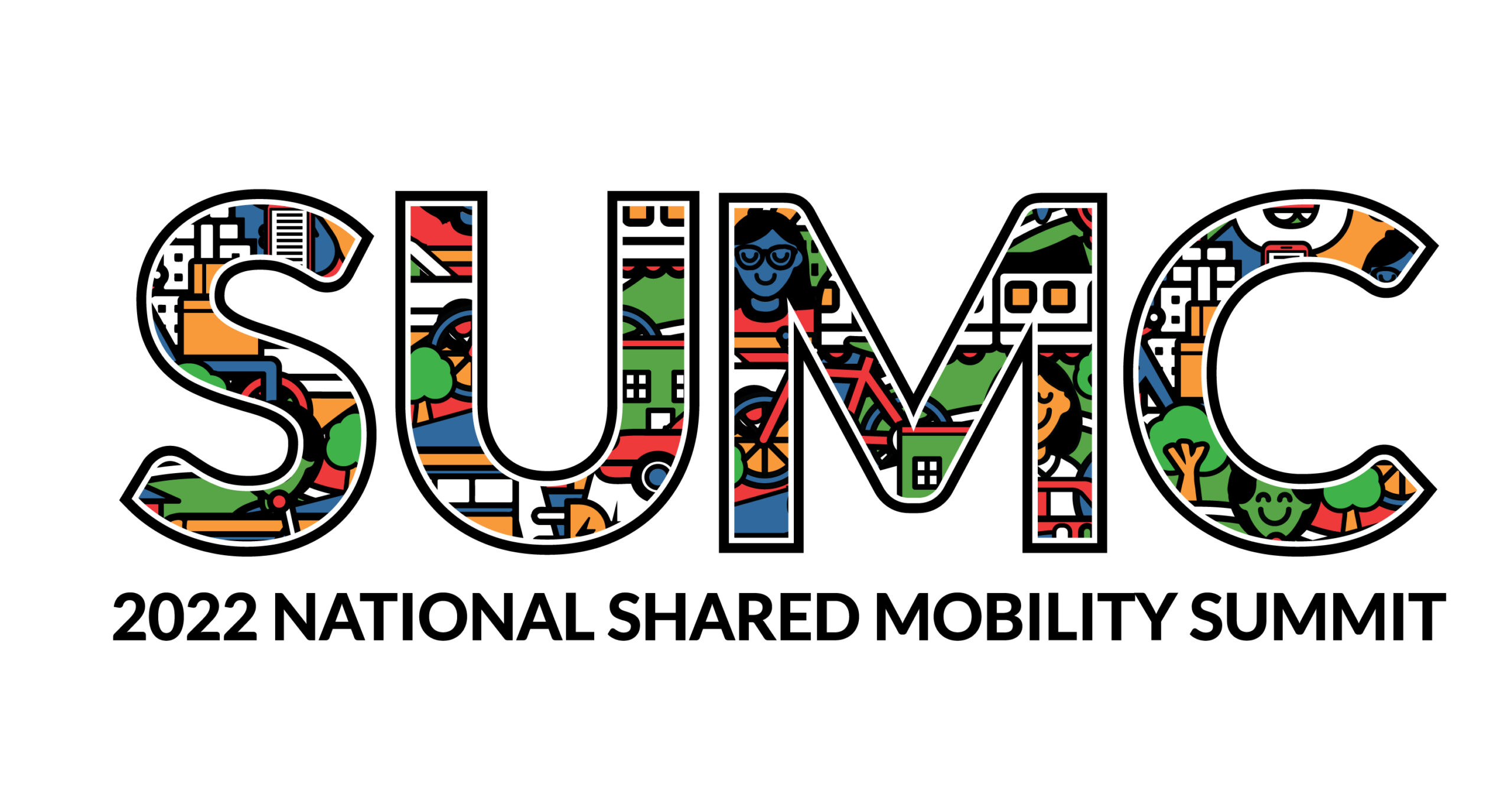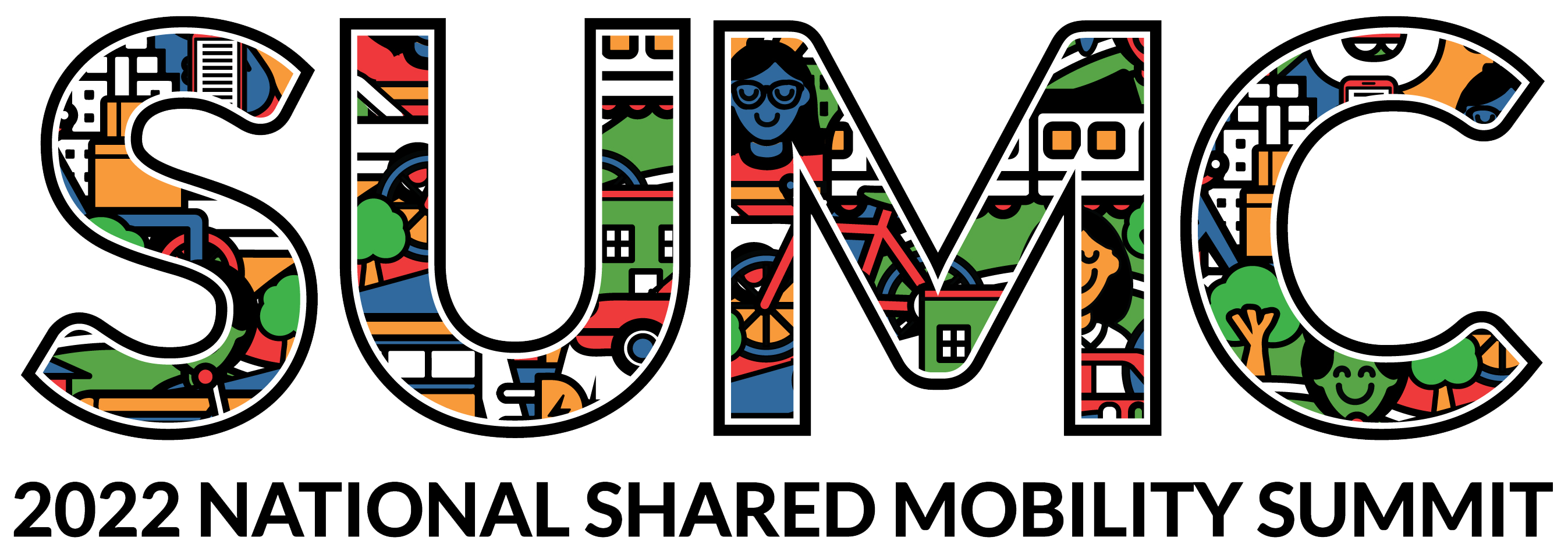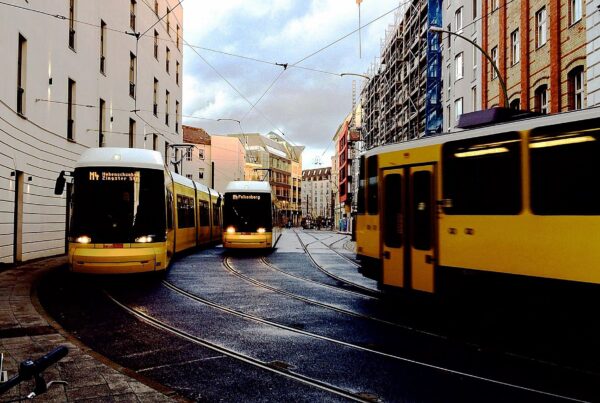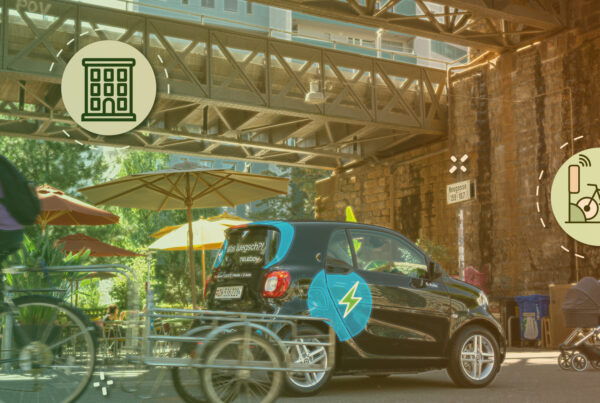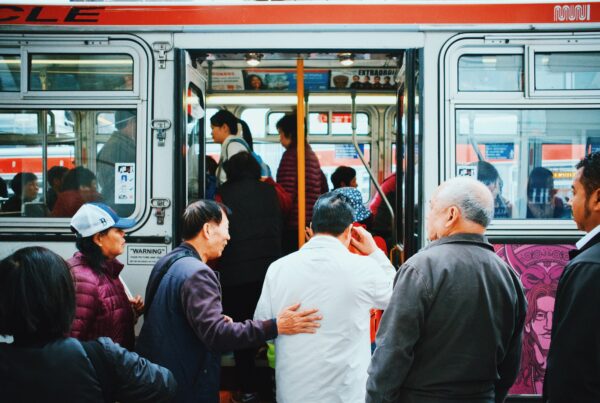The Mobility Hub
Your weekly guide to the latest in shared mobility
SUMC News and Announcements
Are you ready to take collective action for shared mobility?
Registration for the 2022 National Shared Mobility Summit on May 17 & 18 in Chicago opens next week! Pre-register and you’ll be the first to know.
Interested in sponsorship? Let us know!
On Wednesday, Boston Mayor Michelle Wu named SUMC Board Member Tiffany Chu, former commissioner of the San Francisco Department of the Environment, former CEO of software platform Remix and current SUMC board member, to the role.
SUMC wishes Tiffany the biggest congratulations. Her bold vision for cities and strengths in team-building and planning for transportation and environmental issues are applause-worthy. The City of Boston is lucky to have her, as are we.
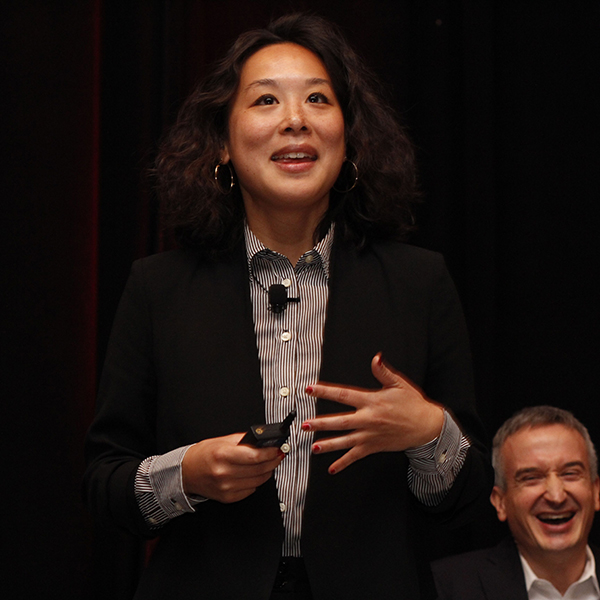
Tiffany Chu speaks at the 2019 National Shared Mobility Summit. Yann Leriche, CEO of Getlink, laughs in the background.
Four fast reads of forward-thinking projects on the Mobility Learning Center
Take a moment to learn about some cross-country innovation with brief overviews of autonomous vehicle projects in Trenton, New Jersey and Fishers, Indiana, bikeshare in Portland, Maine, and one of the first-ever universal basic mobility pilots in Bakersfield, California.
Calling all Urban Planners to be
Get first-hand advice from SUMC’s own Manali Sheth, a program coordinator for the Mobility Innovation Collaborative, who was just featured on the Young Urbanists Blog. Read about her journey.
Help Build Our New Shared-Use Mobility Directory
The Mobility Learning Center is designing and soon building a public directory for mobility providers, software providers, vehicle suppliers, infrastructure suppliers, and everyone in between. To be included in its launch, please fill out this quick survey to join the new Shared-Use Mobility Directory.
Mobility Justice
LA Metro’s fareless transit run kept ridership high, made transit more efficient, and helped the climate while making systems more accessible for the overwhelming majority of low-income riders. So why was it just an experiment?
A report shows motorists underestimate the bite car ownership takes out of their pocket while policymakers and planners underestimate the social costs. Enough car-centric planning that drives hard economic decisions most of all.
Sure speed cameras can reduce the numbers of police on roads, but disproportionately ticketing Black neighborhoods and ZIP codes isn’t exactly a more equitable option.
The New Jersey DOT’s newest project, Trenton MOVES, will eliminate transportation inefficiencies in underserved communities in the state—and the department is looking at AVs as a solution.
Ridehailing/Carsharing/Carpooling
With COVID-19 hitting rideshare companies hard and cutting transportation options, riders in cities have started flocking to taxis with the help of Curb—and this might be just the beginning.
Female rideshare drivers are calling for more safety protections, citing frequently unsafe situations brought about by riders, but their independent contractor status could stand in the way.
Can people’s surroundings, including neighborhood walkability, affect their attitude towards carsharing, ridesharing, and other shared mobility services? This study says yes.
Milwaukee is closing first- and last-mile transit gaps and removing employment barriers by providing residents with an on-demand shuttle service. Fifteen vehicles will connect Milwaukeeans to jobs in the city’s northern suburbs at an accessible price.
Bikesharing & Micromobility
The next delivery you receive could come off a cargo bike—since micromobility is quicker, cleaner, and quieter than other vehicles while cutting carbon. The Guardian points to growth UK, but projections point sharply upward in the US too.
There’s yet more micromobility in Seattle, with the newest project bringing 1500 more e-bikes to the city and inspiring the Seattle DOT to reflect on what they’ve learned in terms of physical environment, neighborhood reach, and surrounding infrastructure.
In case you missed Micromobility World 2022, Bird has you covered with top takeaways from CEO and founder of Bird Travis VanderZanden’s kickoff, including the future of micromobility and the importance of parking infrastructure.
Sarah Mazze is on a mission to make parents feel comfortable biking with their children. Bike League spotlights her efforts as Educator and Safe Routes to School Coordinator in Eugene, Oregon.
Transit
San Diego’s extension of the Blue Line is open!…at double the per-mile cost of equivalent transit projects but completed in half the time, according to a UC Berkeley report. A promise of new parking is, of course, partially to blame.
The pandemic delayed public transportation projects worldwide in 2021, but noticeable service upgrades and additions from Dakar to Calgary kept people moving together. Yonah Freemark, aka The Transport Politic, details what’s in store for 2022.
Utah Transit Authority’s services are going fare-free for February, and (even better) a bill is making its way through the state legislature that would make it permanent year-round.
Transit-oriented development is at the top of the Federal Transit Administration’s mind with new grants awarded, to the tune of $11 million, to 20 projects in 12 states that focus on connecting communities through affordable housing and transportation projects.
Technology
Bird’s scooter batteries are getting a boost with the company’s new Battery Management System that adds dust and liquid protection, real-time diagnostics, anomaly detection, and more for improved safety and operations.
Increased regulatory scrutiny on driver assistance systems aims to fix the “automation complacency” issue to avoid incidents like California’s recent fatal Tesla “Autopilot” crash. Will national safety agencies actually follow through, though?
Freezing temps won’t keep the City of Tampere, Finland, from trialing two new autonomous shuttles that will provide last-mile connections to complement the local tram. Grab a coat and hop in—free of charge!
The New York MTA wants to improve subway safety and reliability by using tech-enabled solutions to keep the tracks clear. Learn how officials and riders feel about the search for smarter transit in THE CITY.
Sustainability
“More money poured into the same broken system does not guarantee it will yield better results…Our work to build more equitable, accessible, and sustainable transportation systems is far from finished, and we cannot miss this opportunity to deliver for our communities.”
U.S. Representatives Jesús “Chuy” García (IL-04), Ayanna Pressley (MA-07), and Mark Takano (CA-41) explain why they are relaunching the Future of Transportation Caucus.
An environment and sustainability professor at Drake University wants to get to the bottom of roadway safety and crashes by studying the near-miss and close-call incidents pedestrians and cyclists have with drivers.
COP26 wasn’t just a climate conference in Scotland but may have real effects on public transport around the world. Legal firm Osborne Clarke lays out the commitments, transition plans, and collaborative efforts that came about and where more needs to be done.
The new Central Park Climate Lab in New York will study the city’s green spaces and look for strategies that sustainably leverage parks to combat the effects of climate change—and set an example for a park near you.
Project Funding Opportunities
2022 AARP Community Challenge
Learn how to apply for a quick-action grant and make your community sustainable, equitable and accessible and all-around enjoyable for everyone. The deadline is March 22.
RFP: Palm Tran Connection Paratransit Services
County of Palm Beach
Palm Beach County, Fl
Deadline: March 18
RFP: Action Plan for Electrification and Growth
Rhode Island Public Transit Authority (RIPTA)
Providence, RI
Deadline: February 15
Have a story for us? Let us know.

